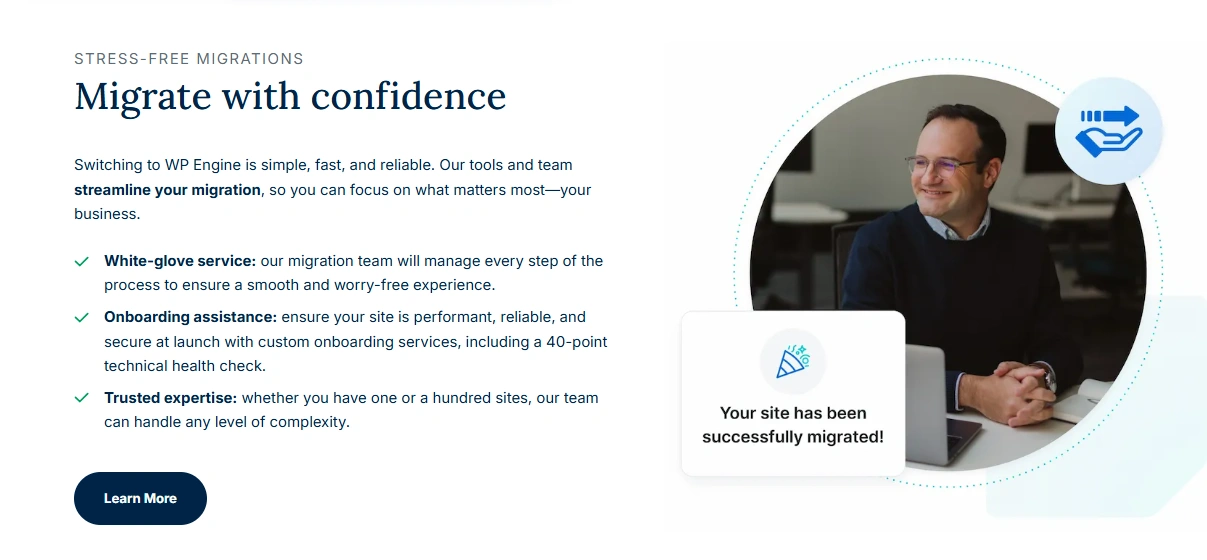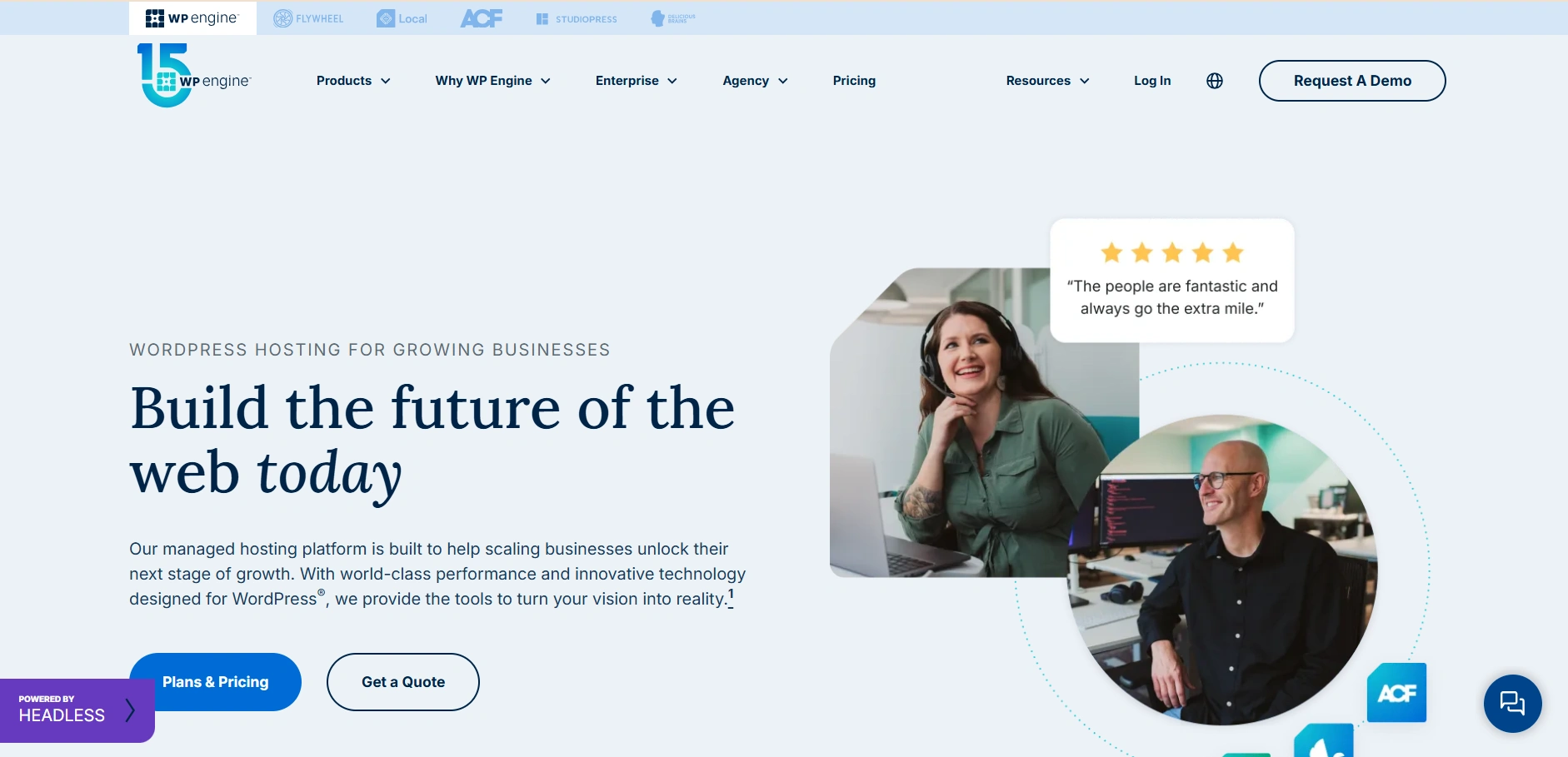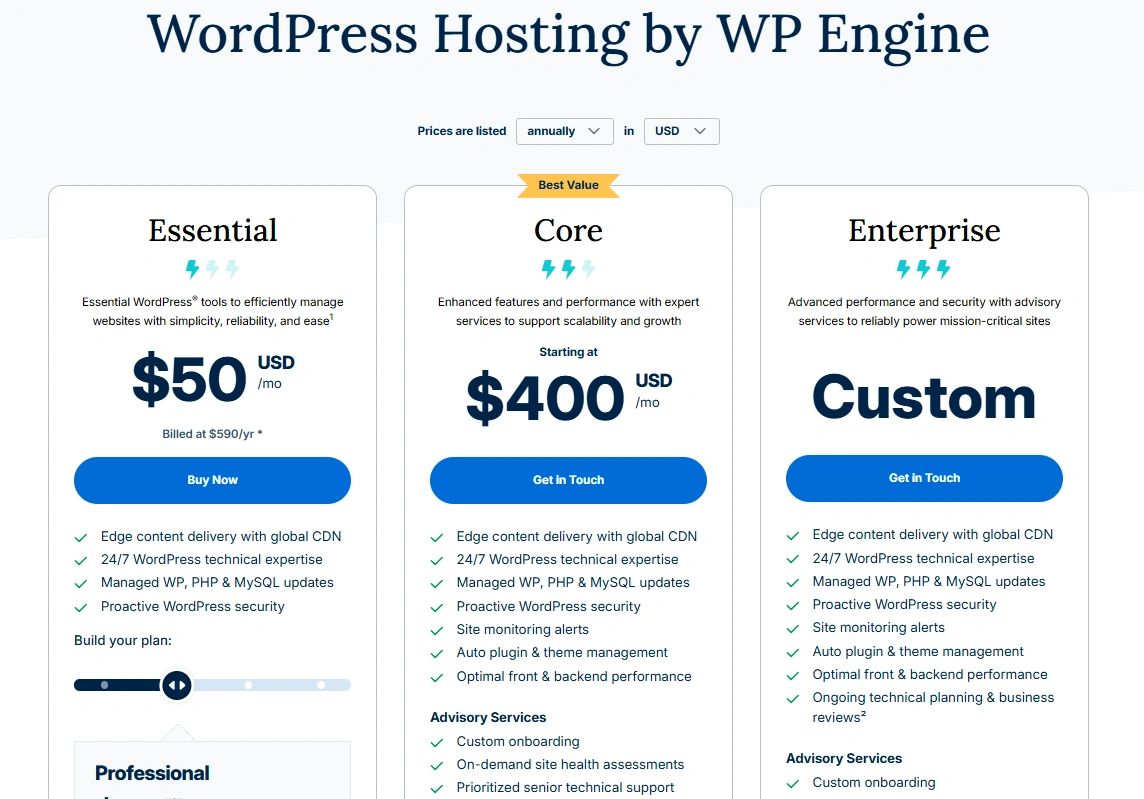WP ENGINE
WP Engine Review 2025: Is This Managed WordPress Hosting Worth It?
WP Engine is one of the most powerful managed WordPress hosting solutions designed for speed, security, and scalability. In this review, we’ll cover the pros, cons, features, pricing, and whether it’s the right choice for your website.
Key Features
- Blazing-fast server speeds (powered by Google Cloud Platform)
- Daily backups and one-click restore
- Staging environments for safe testing
- Automatic WordPress core updates and threat blocking
WP Engine Pricing
Plans start from $20/month and include a 60-day money-back guarantee.
Why I Recommend WP Engine
I've personally used WP Engine for several client projects. Their platform is rock-solid for high-traffic WordPress sites and comes with expert support.
Final Verdict
If you’re serious about WordPress performance and reliability, WP Engine is a top-tier choice.
👉 Click Here to Try WP Engine (60-Day Risk-Free Trial)Disclosure: This page contains affiliate links. We may earn a commission at no extra cost to you.
Hey there! If you’re hunting for a reliable hosting provider for your WordPress site, you’ve probably stumbled across WP Engine. It’s one of the biggest names in managed WordPress hosting, powering over 1.5 million websites for businesses, developers, and agencies worldwide. But with premium pricing and a crowded hosting market, is WP Engine really worth your investment? I’ve scoured the web, dug into user reviews, and analyzed performance data to bring you this in-depth, conversational review. Let’s break it down and see if WP Engine lives up to its reputation.
What Is WP Engine?
WP Engine is a managed WordPress hosting provider that focuses exclusively on WordPress sites. Unlike general hosting companies like Bluehost or Hostinger, WP Engine tailors its platform to optimize WordPress performance, security, and ease of use. Founded in 2010, it’s grown into a trusted name, hosting sites for big brands like Yelp, Asana, and National Geographic. With plans starting at $20/month (billed annually), it’s pricier than shared hosting, but it promises lightning-fast speeds, top-notch support, and a hassle-free experience.
Think of WP Engine as a premium service for WordPress users who want to focus on building their site rather than wrestling with server management. But does it deliver on that promise? Let’s dive into the details.
Key Features of WP Engine
WP Engine packs a ton of features designed to make your WordPress site faster, safer, and easier to manage. Here’s a rundown of what you get:
1. Blazing-Fast Performance
Speed is critical for user experience and SEO, and WP Engine doesn’t mess around here. They use Google Cloud Platform and their proprietary EverCache technology to deliver impressive load times. In a 2024 test by Hostingstep.com, WP Engine handled 100 concurrent users with a jaw-dropping 19ms response time—faster than 17 other WordPress hosts tested. Their Time to First Byte (TTFB) averaged 462ms, and recent edge caching updates have made it even snappier.
Real-world users back this up. One reviewer on Trustpilot raved, “The speed of my WP website is very fast,” while another noted their client’s site with 100k+ monthly views ran smoothly after migrating to WP Engine.
2. Rock-Solid Uptime
Downtime can kill your traffic and revenue, so reliability matters. WP Engine boasts a 99.99% uptime guarantee, with just 42 minutes of downtime over an entire year in Hostingstep’s 2024 tests. While competitor Kinsta edged them out with only 3 minutes of downtime, 42 minutes spread across 12 months is barely noticeable for most users.
Users on X and Trustpilot consistently praise WP Engine’s stability, with one business owner saying, “I live WP Engine for the ‘drama-free’ existence I get. Any other host, I step away, and a site breaks.”
3. WordPress-Specific Tools
WP Engine is built for WordPress, and it shows. You get:
- One-Click Staging: Create test sites to experiment without risking your live site.
- Automated Backups: Daily backups with easy restore options.
- Global CDN: Faster load times worldwide via Cloudflare integration.
- Dynamic Plugin Loading: Reduces page bloat by loading plugins only where needed, cutting page size by 30% on average.
- Genesis Framework and StudioPress Themes: Free access to premium themes for sleek designs.
- Automated Updates: WordPress core and PHP updates are handled for you.
Developers love tools like SSH access, WP-CLI, and Git integration, making WP Engine a favorite for agencies and tech-savvy users. One developer on Capterra said, “Setting up dev, stage, and production environments is as easy as a few guided clicks.”
4. Top-Notch Security
Security is a big deal for WordPress sites, which are often targeted by hackers. WP Engine includes:
- Automated SSL certificates.
- DDoS protection and a website firewall.
- Plugin risk scans to flag vulnerabilities.
- Real-time threat detection.
In years of hosting, users report zero hacks or breaches. One G2 reviewer noted, “Their security is top-notch. We’ve never had any issues.”
5. Stellar Customer Support
WP Engine’s 24/7 support is a standout. Their team consists of WordPress experts, not general tech support, and they’re available via live chat, phone, and ticketing. Users rave about their responsiveness and expertise. A Trustpilot reviewer shared, “An issue with a 3rd-party plugin isn’t their responsibility, but they helped me troubleshoot. Super knowledgeable and friendly.”
Another user on Capterra said, “What takes me 3 hours on a support chat with GoDaddy, I can get done in 3 minutes with WP Engine.” Even business owners with no tech background, like one who trained their office manager to revert sites via WP Engine’s portal, found support accessible and effective.
6. Scalability
WP Engine’s plans scale from small blogs to enterprise-level sites. Their Startup plan supports one site with 25,000 monthly visits, while the Scale plan handles 30 sites and 400,000 visits. For high-traffic sites, custom Enterprise plans offer dedicated servers and personalized support. A user on X mentioned migrating a client with 100k+ monthly views to WP Engine with zero hiccups.

WP Engine Pricing: Is It Worth the Cost?
WP Engine isn’t cheap, and that’s a common sticking point. Let’s break down their shared hosting plans (billed annually, as of 2025):
- Startup: $20/month – 1 site, 25,000 visits, 10GB storage, 50GB bandwidth.
- Professional: $58/month – 3 sites, 75,000 visits, 15GB storage, 125GB bandwidth.
- Growth: $151/month – 10 sites, 100,000 visits, 20GB storage, 200GB bandwidth.
- Scale: $241/month – 30 sites, 400,000 visits, 50GB storage, 500GB bandwidth.
Dedicated hosting (Premium and Enterprise) starts at custom pricing, requiring a sales quote. You also get discounts for annual prepayments, and WP Engine often throws in deals like four months free with certain plans.
Compared to budget hosts like Bluehost ($2.95/month) or Hostinger ($1.99/month), WP Engine’s pricing feels steep. But you’re paying for managed WordPress hosting, not shared hosting. Competitors like Kinsta and Flywheel are in the same price range, while SiteGround’s managed plans are slightly cheaper but less WordPress-focused.
The Value Question
Is it worth it? If you’re running a serious WordPress site—say, an eCommerce store, agency portfolio, or high-traffic blog—WP Engine’s speed, security, and support justify the cost. A G2 reviewer said, “With WP Engine, I don’t need a back-end developer or system admin. It enables front-end-only administration.”
For small hobby blogs or startups on a tight budget, though, WP Engine might be overkill. SiteGround or DreamHost offer managed WordPress hosting at lower prices, though with fewer premium features.
Pros of WP Engine
Here’s why WP Engine shines:
- Lightning Speed: Industry-leading load times and TTFB, thanks to Google Cloud and EverCache.
- Reliable Uptime: 99.99% uptime keeps your site online.
- WordPress Expertise: Tools and support tailored for WordPress users.
- Amazing Support: Fast, friendly, and knowledgeable 24/7 team.
- Robust Security: Keeps your site safe from hacks and threats.
- Developer-Friendly: Staging, SSH, and Git make life easier for pros.
- Scalability: Plans grow with your site, from small blogs to enterprises.
Cons of WP Engine
No host is perfect. Here are WP Engine’s drawbacks:
- Premium Pricing: Starting at $20/month, it’s not budget-friendly.
- WordPress-Only: If you use another CMS, look elsewhere.
- Plugin Restrictions: WP Engine bans certain plugins (e.g., caching or backup plugins) that duplicate their features or strain servers. This frustrates some developers.
- Limited Entry-Level Options: The jump from 1 site ($20/month) to 3 sites ($58/month) is steep.
- No Domain Registration: You’ll need a separate registrar, unlike hosts like Bluehost.
- Mixed Experiences: Some users report inconsistent support or issues with custom setups, like file system changes.
One developer on WPBeginner complained, “WP Engine refuses to support file system customization. If you change your content directory, they won’t support it.” Another user on Trustpilot called their last experience “awful,” though these are outliers among mostly positive reviews.

Performance Tests: The Numbers Don’t Lie
To get a clear picture, let’s look at WP Engine’s 2024 performance data from Hostingstep.com, based on a test site running the Twenty Twenty-Four theme with essential plugins:
- Load Handling: 19ms response time with 100 concurrent users.
- TTFB: 462ms (improved post-edge caching rollout).
- Uptime: 99.99% (42 minutes downtime over 12 months).
- Page Load Speed: Under 0.5 seconds in GTmetrix tests.
These numbers put WP Engine at the top of the pack for speed and reliability, though Kinsta’s slightly better uptime gives it a slight edge. Still, WP Engine’s performance is elite, especially for high-traffic or eCommerce sites.
User Reviews: What Are People Saying?
I dug through Trustpilot, Capterra, G2, X posts, and web reviews to gauge user sentiment. WP Engine has a 4-star rating on Trustpilot (1,545 reviews) and glowing feedback elsewhere, with 97% of HostScore users recommending it. Here’s the vibe:
The Good
- Support Wins: Users love the fast, expert support. A business owner on HostScore said, “In a world of awful tech support, WP Engine is the ultimate outlier.”
- Speed and Stability: Agencies and developers praise the performance. One X user said, “I sure do love working with @wpengine for WordPress hosting. Super responsive on customer support.”
- Ease of Use: The intuitive dashboard and one-click tools get high marks, even from non-techies. A Capterra reviewer noted, “The simplicity and intuitiveness of the software is noticeable.”
The Not-So-Good
- Pricing Gripes: Small businesses and hobbyists often balk at the cost. A Capterra user said, “The service would be better if pricing is readjusted to help small businesses.”
- Plugin Limits: Developers dislike the restricted plugin list. One user on WPBeginner called it a dealbreaker for custom setups.
- Occasional Hiccups: A minority of users reported slow support or issues with complex configurations, like one who said, “They like to blame the ‘rookie developer.’”
Overall, positive reviews far outweigh the negatives, especially for users who value performance and support over budget constraints.
WP Engine vs. Competitors
How does WP Engine stack up against other managed WordPress hosts? Let’s compare it to Kinsta, SiteGround, and Flywheel:
- WP Engine vs. Kinsta: Kinsta offers similar premium features and slightly better uptime (99.999%). However, WP Engine’s support is often rated higher, and its pricing is marginally lower. Kinsta’s plans start at $30/month.
- WP Engine vs. SiteGround: SiteGround is cheaper (starting at $3.99/month) and offers great WordPress tools, but its performance and support don’t match WP Engine’s premium tier. Ideal for budget-conscious users.
- WP Engine vs. Flywheel: Flywheel (owned by WP Engine) is more agency-focused with similar features but slightly lower pricing. WP Engine feels more polished for businesses and developers.
If you need non-WordPress hosting, providers like Bluehost or DreamHost offer broader options at lower costs but lack WP Engine’s specialized focus.
Who Is WP Engine Best For?
WP Engine isn’t for everyone, but it’s a perfect fit for:
- Businesses and eCommerce Sites: High-traffic sites benefit from speed, scalability, and security.
- Developers and Agencies: Tools like staging, Git, and SSH streamline workflows.
- WordPress Enthusiasts: If you’re all-in on WordPress, WP Engine’s tailored platform is a dream.
- Users Who Value Support: 24/7 expert help is a lifesaver for non-techies and pros alike.
It’s not ideal for:
- Budget Users: Small blogs or startups may find SiteGround or Hostinger more affordable.
- Non-WordPress Sites: WP Engine is WordPress-only, so look elsewhere for other CMSs.
- Highly Customized Setups: Plugin restrictions and file system limitations can frustrate advanced developers.
My Verdict: Should You Choose WP Engine?
After diving into WP Engine’s features, performance, and user feedback, I’m impressed but not blindly sold. It’s a premium host that delivers on its promises: blazing speed, rock-solid uptime, top-tier security, and exceptional support. The numbers—19ms response time, 99.99% uptime, and sub-0.5-second load times—are hard to argue with. Add in WordPress-specific tools like dynamic plugin loading and one-click staging, and it’s clear why over 200,000 customers trust WP Engine.
But the price tag, starting at $20/month, isn’t pocket change, and the plugin restrictions or lack of domain registration might annoy some users. If you’re running a serious WordPress site and can afford the cost, WP Engine is a no-brainer. It’s like hiring a full-time WordPress expert to manage your hosting. For hobbyists or small sites, though, cheaper alternatives like SiteGround or DreamHost might suffice.
This website is not affiliated with, endorsed by, or the official website of any brands mentioned. We may earn a commission from qualifying purchases.

